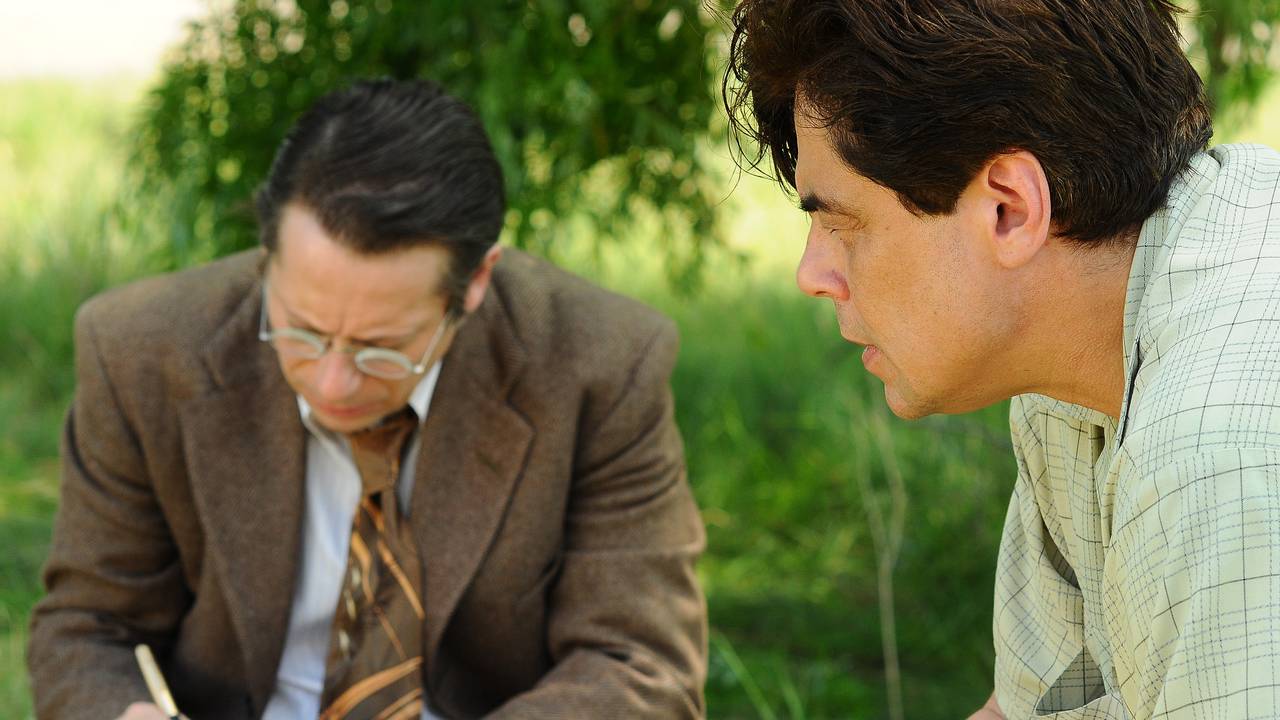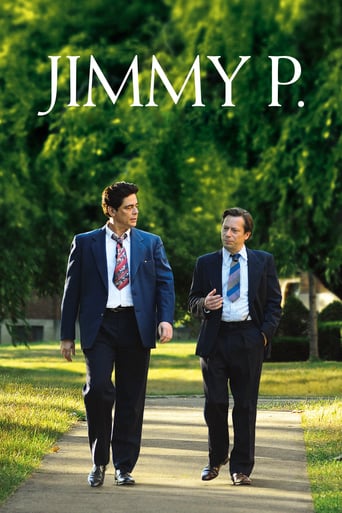Solidrariol
Am I Missing Something?
Billie Morin
This movie feels like it was made purely to piss off people who want good shows
Roy Hart
If you're interested in the topic at hand, you should just watch it and judge yourself because the reviews have gone very biased by people that didn't even watch it and just hate (or love) the creator. I liked it, it was well written, narrated, and directed and it was about a topic that interests me.
Sienna-Rose Mclaughlin
The movie really just wants to entertain people.
alevinadresi
The other reviewers already provided extensive descriptions about the movie's plot and characters. So I will just skip it. This is a slow-paced movie but it flows in its own pace and takes you with it. There are some parts that you can relate to yourself, even though you are not a traumatized veteran, that makes you go "ahhh I know the feeling" or "It happens to me, too". I loved the way the dreams were shown to the audience. That made the movie more interesting and fun to watch for me. Benicio Del Toro was great as always. He adjusted himself to the slow-pace of the movie so well that it feels so natural. And thank God that I finally could see him at least kiss a lady in a movie. Hallelujah! Although at times, I must admit it was hard to believe that he was Native Indian, especially in the scenes when he is surrounded by real Native Indians, he still pulls it so well and gives a terrific performance, so much that you feel for him, and believe that he is in fact a person with a soul pain. I also loved how well Mathieu Amalric played the eccentric anthropologist although his character's eccentricity was a bit of cliché. He still managed to make me believe in his role. All in all, if you are not into fast-paced action movies or movies with a surprise unexpected turn of events, but more inclined to watch real world movies with a human touch, than you should give this one a chance.
EarthFromObserver
Firstly, I'm not a movie buff nor am I an expert on the director or anyone else involved in making this movie, I just watch movies based on whether or not I fancy watching them.The acting left me with a feeling of warmth towards the characters, sure it's not a short film, and some of the scenes could probably have been shorter, but I feel that would've taken away from the tonality. The movie seems well written and likable, but the pacing and content won't be everyone's 'cup of tea'. In short, the movie is good, it's not an action movie, there's almost no excitement, but who would read the synopsis and think there would be any? There's really nothing left to say about this film as far as I can see, I'd recommend it, but not to everyone, and can't see a group of lads sitting round with cans of lager enjoying it, it's more of a 'sit and watch alone' type of thing.
sfviewer123
An intellectual labor of love in which the director tries to recreate the psychotherapeutic relationship between a French psychoanalyst (in reality a Hungarian-German Jew who converted to Christianity) and a Blackfoot Indian vet suffering from inexplicable symptoms in the late 1940s in a VA hospital in Topeka, Kansas.Played by Benicio del Toro (who is Puerto Rican) and Mathieu Almaric (who is half-French half-Polish Jewish), the film drags at times but does delve into some interesting psychological (although of course it goes *much* more seamlessly/painlessly than most analyses in reality).Almaric's character wins over Del Toro's with his initial knowledge of Native American cultures (actually Mojave but there are parallels to the Blackfoot). From there he tries to synthesize his anthropological knowledge with what seem to be a pretty standard fare of sexualized Freudian clichés (witnessing the primal scene, explicit discussions of vaginas (which I thought Del Toro's character spoke about far too easily for the mores of that day and age)).The relationship between the two men are supposed to be a life-changing event but I felt the film fell a little short in depicting that reality (also a film review (for which I know the director is not responsible) described their friendship as resulting from their both being outsiders, but Almaric's character never reveals his true background (his lover mentions at one point the fact that he changed his name but that is it, perhaps there were other scenes that didn't make it past the editor (I went to the premiere in NYC with the director and main actors and they said there are a lot of scenes that got cut)).In the latter part of the movie there are strong hints that Jimmy's (Del Toro's character) headaches, fits of rage and alcoholic binges are the result of systematic sociopolitical mistreatment of native Americans but the subject is only strongly hinted at, not really discussed explicitly by Jimmy in any deep or meaningful way. This was to me perhaps more interesting than the anthropological Freudianism of the first 90 minutes of the film, but the director was trying to adhere to a book on the subject and real-life events (psychology back then was even more grossly unaware of psychopolitical factors compared to now).Perhaps subtly discourages the notion that Jimmy is suffering from PTSD (a diagnosis which did not exist at the time, but the phrase "shell shock" is not used either) because he never saw combat or killed anyone (he was involved in mine-clearing operations after the German retreat). Also interesting insofar as his injury was to his head, thus perhaps implicitly challenging the often presumed relationship nowadays in vets between TBI (traumatic brain injury) and PTSD? (Then again the director was following real-life events so I don't know his intentionality.)A worthwhile film but a little odd insofar as it (to me) underemphasizes the ethnocultural forces in the characters in favor of a "special friendship" (in a universalized way) despite the fact that it is the decultured nature of American psychiatry which was at the root of doctors' inability to help Jimmy in the first place. Also couldn't stand the way a couple of actors (thinking of Almaric and Joseph Cross specifically) who think that acting means being as anxious and/or intense as possible in every scene.P.S. The film does drag a bit (114 minutes) (I'm not someone who normally complains about "art-house" films with slower (French) pacing either.)
Dr Jacques COULARDEAU
Based on a true story, this film is a documentary fiction. A Blackfoot Indian who has fought in France in the Second World War and had had an accident there that let him comatose for a couple of days experiences great behavior disorder when back I n the USA. He is treated in Topeka, Kansas, as a veteran and they come to the conclusion that there is nothing physiologically wrong with him and at the same time the diagnosis that comes next, that of schizophrenia, does not accommodate all the symptoms. The boss of this military hospital knows a French anthropologist, trained as a psychoanalyst, in New York and he invites him for a couple of consultations with the patient. From a couple it will lead to a few dozens if not more, one a day for a rather long period.At the time psychoanalysis could only look for personal disorders at the sexual level having to do with parents, infancy, childhood, and then women (for men). The case concentrates on women and the patient finds some relief in that approach. This is very interesting how the anthropologist who is a specialist of come North American Indians, the Mojave actually, uses his knowledge of Indian culture and one language to build some trust between him and the Indian and on the basis of that trust he is able to penetrate the private life and mind of the Indian. But he does not really use the understanding of Indian culture to see what is shown in the film but not exploited at all, the fact that the Indians are systematically negated in their culture by all kinds of institutions. We can see in the film the fact that this military hospital for veterans does not have one Indian nurse or doctor able to understand the alienation of Indians in white society. Then you have the daughter of the Indian who is in the hands of catholic nuns for her education. Then you could speak of the way these Indians dress in the most white American way possible, with ties, shirts, suits, and the girls the very same way with scarves, dresses, etc. Hair cuts are standard north American. At the same time this Indian cannot get money at the post office or the bank without a good Caucasian (not North American since the French doctor is able to do it) signing for him. A white nurse tells the Indian a tall tale one day in another hospital where he is supposed to go through special tests, and she cannot in any way ignore that what she is telling him is B.S. And even the French doctor who was called in because he was an anthropologist who had spent two years with the Mojave Indians, at the end, asserts that he did not help the Indian because he was an Indian but because he was suffering. In other words he negates his own expertise. And that is justified in his mind because he did think his expertise was not with Indian culture (that was only a means to build trust) but psychoanalysis. He even, early in the film, creates some blurred situation when he advocates the typically French godless secular philosophy to an Indian who declares himself a Catholic though he knows about old Indian religions that he has "rejected" under the influence of course, but not of alcohol this time. It is also called duress.The problem we are dealing with here is Post Traumatic Stress Syndrome of American Indians who have been vastly exterminated, then locked up in reservations under rules that forced them to drop their cultures, their dances and their languages, to get educated and integrated in the American society, language, culture and all. What is the intention of Arnaud Desplechin? To remain as close as possible to the way the case was treated at the time? Maybe but naïve since the audience cannot sort out the real stake here. Yet it is surprising he does not use what has become standard today over the last ten years. It is called the decolonization of the mind. He only shows how the Indian mind is colonized and never questions his psychoanalytical approach that makes the syndrome the result of personal sexual problems.Dr Jacques COULARDEAU

